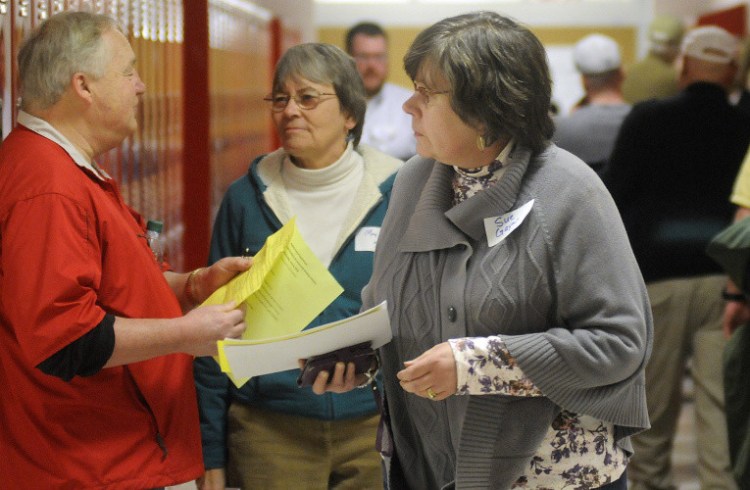AUGUSTA — Maine’s opiate crisis won’t be solved without the help of state and local officials, according to Denis Thoet. That’s why Thoet, a retired journalist and farmer who lives in Augusta, attended a forum on the state’s drug problem Wednesday night.
The forum was the second of its kind to be held at Cony High School this year, and it consisted of several break-out sessions in which six different responses to and aspects of the drug crisis were discussed: advocacy, treatment, medicine, education and prevention, recovery and enforcement.
Given Thoet’s own belief in the importance of public policy to solving the crisis, he attended the session on advocacy led by attorney and Augusta City Councilor Marci Alexander. He specifically would like to see more treatment options for those addicted to heroin and other opiates, and discussed with Alexander strategies for better delivering his message to elected leaders.

Marci Alexander, left, encourages Denis Thoet to send a letter to legislators for public access to an opiate antidote during the workshop sessions of the opiate symposium at Cony High School in Augusta on Wednesday.
“I think it’s important,” Thoet said of advocacy. “We have a problem here, and the problem is not being addressed by government. We need to work with government.”
While the January forum was attended by nearly 300 concerned citizens, just 90 showed up at Wednesday’s, which was titled “Take Back Our Community: Action in Augusta” and organized by groups including Healthy Communities of the Capital Area, the Augusta Board of Education and the Augusta Police Department.
But if the first forum was well-attended, those who showed up at the second had more opportunities to participate. The individual sessions were led by educators, law enforcement officers and addiction counselors, among others. Following the break-out sessions, each facilitator presented some of the solutions that were brainstormed by those in the session.
Ryan Reardon, interim sheriff of Kennebec County, helped lead the session on recovery. After meeting with residents in that session, he said, he began thinking that a pamphlet that provides a comprehensive list of addiction treatment resources could be left in public places such as waiting areas of the jail.
Melanie Thompson, a doctor at MaineGeneral Medical Center, said her group discussed ways health care providers could prescribe fewer opiates and use less stigmatizing language when treating drug users.
At this point, the stakes for coming up with effective solutions to the drug crisis are great.
Statewide, drug overdose deaths increased by 31 percent in 2015, reaching a new high of 272 fatalities that was fueled by a near doubling of heroin deaths, according to data released earlier this month by the attorney general’s office. There were 107 deaths from heroin, compared to 57 heroin overdoses the previous year.
In Augusta alone, the Augusta Fire Department responded to 50 heroin overdoses in 2015, up from 26 in 2014 and just six in 2007, according to Fire Chief Roger Audette. The Augusta department used Narcan, a drug which can revive heroin users who have overdosed, 44 times in 2015 to revive people who weren’t breathing.
The issue hit home for many who attended the forum Wednesday night. Psychologist Fred White was facilitating the event, and when he asked how many were affected personally by the crisis, at least half of the audience raised its hands.
Few of the solutions they were brainstormed Wednesday night were new, but according to White, at least a few of them could be implemented in the next day, week or year.
Charles Eichacker — 621-5642
Twitter: @ceichacker
Copy the Story LinkSend questions/comments to the editors.



Success. Please wait for the page to reload. If the page does not reload within 5 seconds, please refresh the page.
Enter your email and password to access comments.
Hi, to comment on stories you must . This profile is in addition to your subscription and website login.
Already have a commenting profile? .
Invalid username/password.
Please check your email to confirm and complete your registration.
Only subscribers are eligible to post comments. Please subscribe or login first for digital access. Here’s why.
Use the form below to reset your password. When you've submitted your account email, we will send an email with a reset code.